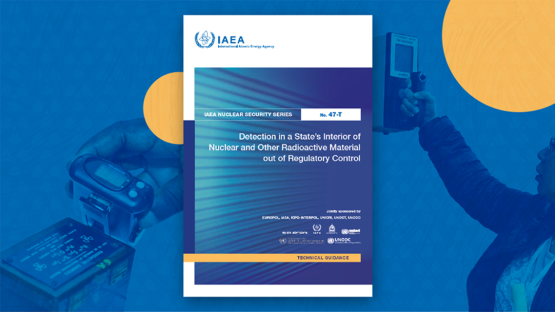A new IAEA publication titled Detection in a State's Interior of Nuclear and Other Radioactive Material out of Regulatory Control offers law enforcement agencies and frontline officers detailed guidance to support them in combatting criminal acts involving nuclear or other radioactive material that has fallen out of regulatory control.
“The new publication is added to a variety of tools offered to countries by the IAEA to help them fulfil their national responsibilities for nuclear security,” said Itimad Soufi, Head of the IAEA’s Nuclear Security of Materials Outside of Regulatory Control Section.
The comprehensive guidance in the publication will assist countries in planning and implementing appropriate nuclear material detection operations to mitigate the current threats and risks they face within their territory. This includes in-depth information on integrating systems and measures to detect criminal or other unauthorized acts involving nuclear and other radioactive material into existing security measures.
The publication also outlines operational steps and provides examples for conducting detection operations, both with and without the use of radiation detection equipment. In addition, a template for developing a joint detection operation plan, guidance on how to manage information alerts and details about radiation detection equipment are among the practical tools included in the publication.
The publication will also serve as a reference manual for frontline organizations and officers to guide human resources development and the selection of detection equipment. This will benefit authorities responsible for managing nuclear security systems within a country, in particular law enforcement agencies, ministries, national security organizations, emergency services, national regulators and medical and health professionals.
This publication is jointly sponsored by the IAEA together with the European Union Agency for Law Enforcement Cooperation (EUROPOL), the International Criminal Police Organization-INTERPOL (ICPO-INTERPOL), the United Nations Interregional Crime and Justice Research Institute (UNICRI), the United Nations Office of Counter-Terrorism (UNOCT) and the United Nations Office on Drugs and Crime (UNODC).
“The publication offers detailed guidance with a focus on better supporting different roles in nuclear security. It is part of the IAEA’s Nuclear Security Series, which provides international consensus guidance on all aspects of nuclear security to support countries as they work to fulfil their responsibility for nuclear security,” Soufi said.
The new publication is available free of charge here. Further information on the IAEA’s Nuclear Security Series, including resources in six languages, can be found here.





